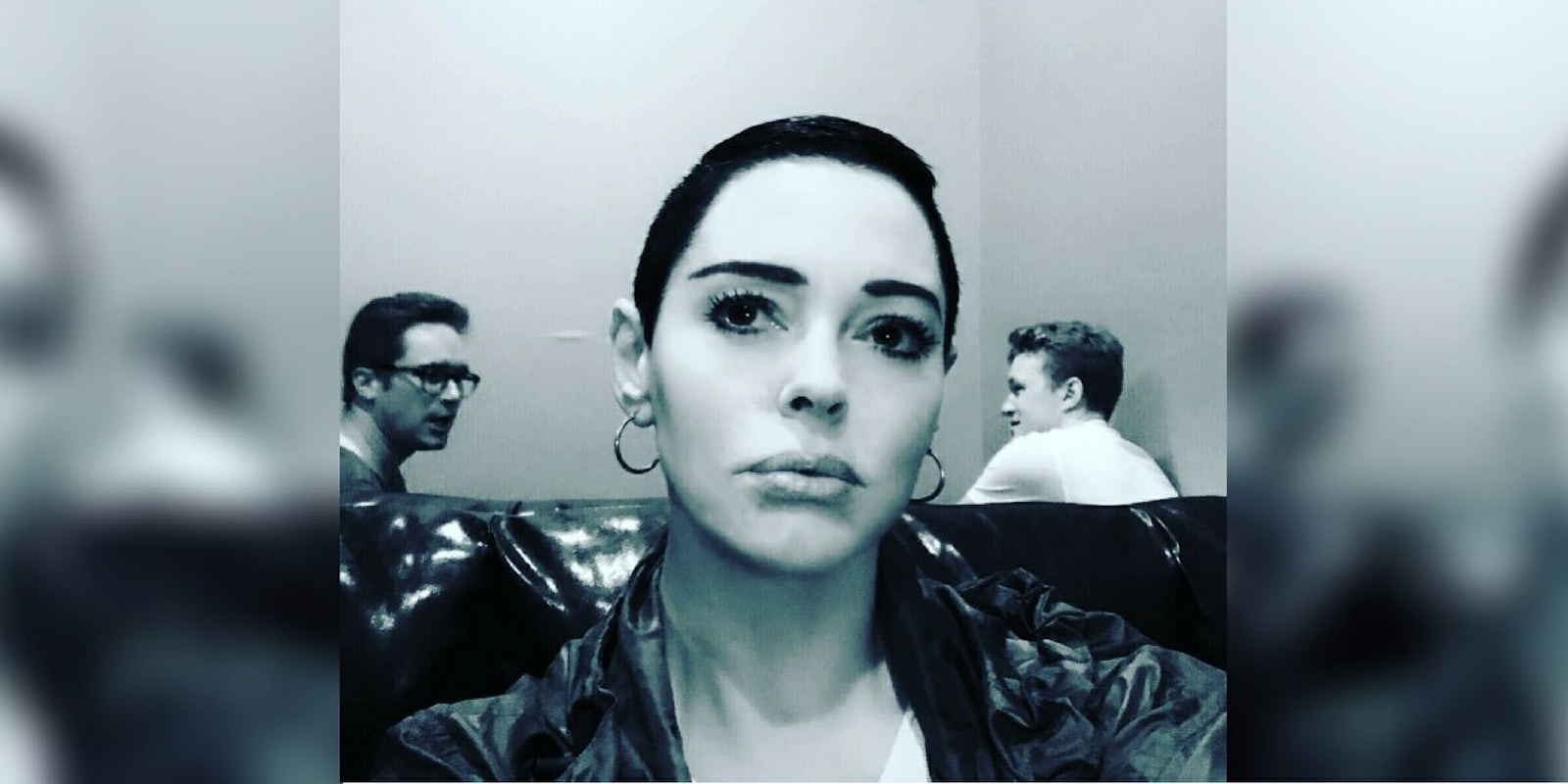After three years of writing and three months into the fall of her “monster”—Miramax producer Harvey Weinstein—actress and activist Rose McGowan is sharing her story in her upcoming memoir Brave.
In the book, which drops on Jan. 30, McGowan details her childhood in Italy, her life as a runaway, and her eventual transfer from one cult to another: Hollywood. In a book preview and interview with Vanity Fair, McGowan continues to unveil exploitative men of the industry and includes her relationship with director Robert Rodriguez.
In McGowan’s Brave, according to the magazine profile, she says that trusting Rodriguez with her experience with Weinstein, who reportedly sexually harassed and assaulted dozens of industry women, including McGowan, led to further manipulation by Rodriguez himself. McGowan says that Rodriguez used knowledge of her assault against her, both in a scene she acted out with Quentin Tarantino for the Grindhouse series, and in selling the series to Weinstein:
The alleged assault, and her agreement to keep quiet, sowed the seeds for more destruction. In one of the memoir’s most gripping chapters, she recounts her affair with director Robert Rodriguez (Spy Kids, From Dusk till Dawn), a smooth-talking, sensitive-seeming guy who turned out to be a Svengali. He and Quentin Tarantino were planning a double feature—Planet Terror and Death Proof—based on pulp movies of the 1970s, and he wanted McGowan to star. McGowan fell hard and fast, trusting Rodriguez enough to tell him about her experience with Weinstein. He proceeded to use the knowledge against her, she claims, as a tool for mind games, starting with a scene in which Tarantino, playing a character in his movie, attacks McGowan’s character. “I was in a backward world,” she writes. “I was losing my grip on sanity.” In what McGowan interpreted as the ultimate act of cruelty, Rodriguez “sold our film to my monster.”
Rodriguez had previously released a statement to Variety regarding his involvement with McGowan and Weinstein after tens of women had their stories of Weinstein’s abusive behavior published in early October. In the statement, Rodriguez characterized his casting of McGowan in a “bad ass” role as a move to spite the producer. (Quentin Tarantino himself said he had known about the producer’s abuse for decades.)
Rodriguez said that after McGowan told her she had been blacklisted from working for Miramax after the assault, he came up with a plan for Weinstein to “literally pay” for what he did by casting McGowan in the role. However, he said the film was then “buried” as a power play, and that he never discussed Weinstein’s behavior because he didn’t want to jeopardize the non-disclosure agreement that McGowan signed as part of a settlement after the assault.
“I then told her that if she wanted a role that I would write it for her and Harvey’s company would have to fund it. Rose agreed, and the deal was done. I found it so commendable that she was putting the incident behind her and moving forward with her career. I wanted to help. We had a plan, and more importantly, we had a mission,” Rodriguez wrote in the statement. “I’ll admit it felt really good at the time to realize we could use our art form to help Rose right a serious wrong in both how he victimized her years earlier, but also what Harvey was doing to a wonderful actress by blacklisting her and keeping her from working with filmmakers that would have wanted to work with her. At the time, it was the only thing we could do.”
McGowan’s representation declined to comment at the time of Rodriguez’s statement.
H/T Vanity Fair
Update 8:20am CT, Jan. 2: Robert Rodriguez reached out to Vulture with the following statement, writing that Vanity Fair did not reach out to him for comment, and that “there are some key factual errors to the piece.”
“These inaccuracies may appear to put me at odds with Rose, but I have no quarrel with her. It’s when publications don’t fact check these basic things, you end up with something inaccurate that then has to be disqualified.”
Rodriguez’s account challenges that of McGowan, writing that he couldn’t have betrayed her by selling the film to Bob Weinstein because the Weinsteins were funding the films before they began shooting four months prior.
“There was certainly ample time for Rose to decide not to be in a film funded by the Weinsteins and reject the movie and the script before shooting ever began.”
He also stated that Tarantino’s scene where his character attacks McGowan’s character was in the script five months before shooting.
“If there was any objection to the scene there was plenty of time to address it,” Rodriguez states. “It was never brought up as being an issue. In fact, the point of the scene was always to be empowering because it’s when her character turns the tables against her oppressors.”


